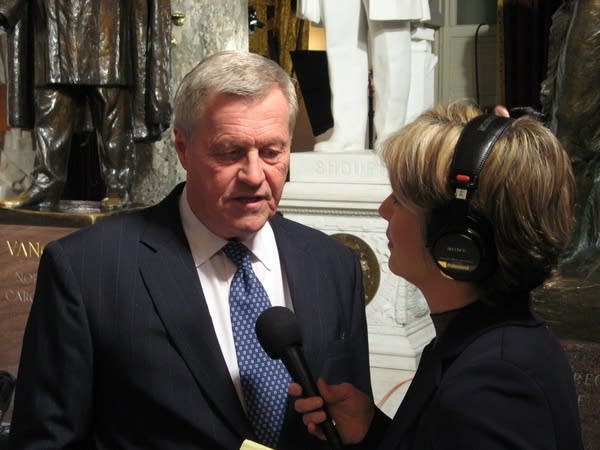House proposes farm bill changes

The House and the Senate have been stalled for several months as legislators try to craft a package acceptable to the White House. The farm bill affects a broad range of government spending, including farm subsidies, conservation spending and the food stamp program.
Peterson said he's meet with Bush administration officials and the two sides have agreed to compromise on overall farm bill spending.
He said that number is about 3 percent, roughly $8 billion, under what's contained in the House version of the farm bill passed last summer. Peterson told a news conference the compromise is a realistic effort to break a stalemate.
"Somebody has got to provide leadership and bring reality to this process," said Peterson. "There hasn't been a hell of a lot of it so far. And that's what we're trying to do."
Create a More Connected Minnesota
MPR News is your trusted resource for the news you need. With your support, MPR News brings accessible, courageous journalism and authentic conversation to everyone - free of paywalls and barriers. Your gift makes a difference.
The farm bill is important for Minnesota. In the last decade it's paid state farmers an average of about $900 million a year in crop subsidies and other types of payments.
The size of those payments to farmers has been criticized. Environmental groups say the subsidies promote overproduction, often on erosion prone lands. There's also been criticism of who gets paid. The money goes to family farmers, but also to some city residents who own cropland as an investment.
Peterson said without significant changes the farm bill faces an almost certain Presidential veto. Just last week President Bush restated his objections to the bill.
"Confident we can come together to get a good farm bill," said President Bush. "But if Congress sends me legislation that raises taxes or not make needed reforms I'm going to veto it."
Peterson said his proposal would make across the board cuts in farm spending.
On subsidies, Peterson said his plan would rescind the crop target price increases contained in the original House bill.
Peterson said he knows his plan will not make many people happy. One of those people might be Senate Agriculture Committee chair Tom Harkin of Iowa.
Peterson's farm bill proposal is about $6 billion over the original spending guidelines called for by President Bush. However, in a compromise, the president has signalled he could accept the higher figure.
However, Iowa Senator Harkin said that number is still too low.
"I think we're going have to have something more than that $6 billion," said Harkin. "How much more remains to be seen, and that's what negotiations are all about. And we'll be negotiating with the House on that basis."
Farm bill negotiators face a number of deadlines. On March 15 a temporary extension of the old farm bill expires. Peterson is unwilling to pass another. However, Harkin said another extension may be possible. If there is no extension or new farm bill by March 15, it could create a potentially politically explosive situation.
Farm law would revert back to legislation passed in 1949. Under that law, crop and dairy price supports would be much higher than current law allows. For example, milk supports would be a third higher than present markets. If that sort of price hike is passed on to consumers, it could be something voters consider when they vote in November.
